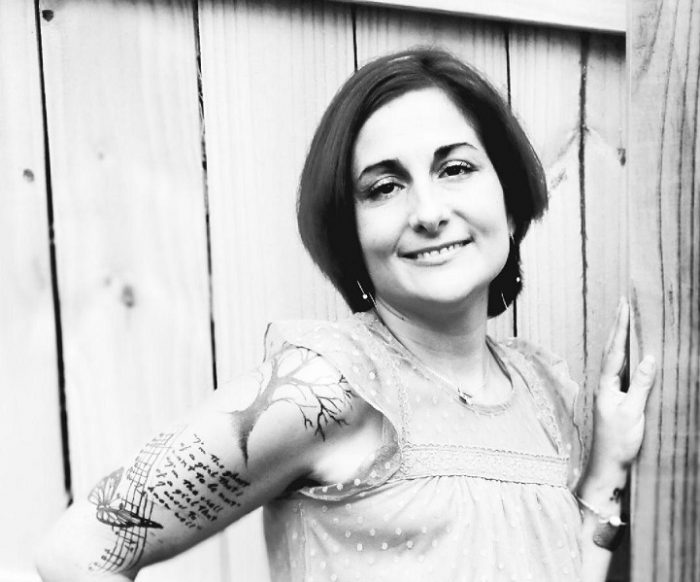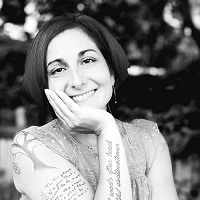As I sat in my local café with a steaming cup of coffee, notebook in front of me, ready to jot down ideas for my next creative project, I noticed a young father and his little girl placing their order at the “way too tall” counter.
The little girl’s face was lit with excitement and anticipation for her fruity, frosted drink from the friendly barista, who seemed to genuinely love her job—smiling at people, creating her own type of masterpieces for their enjoyment. But there was a familiar look in the barista’s eyes as she looked gently at the young girl: it was envy, pain…a look of loss.
I know this look well. I spot it almost immediately in ordinary strangers I come across every day.
As the barista handed the little girl her drink, she smiled tenderly and said, “You take care of him, okay?” while gesturing toward the little girl’s father. The girl responded with a giggle, “I’ll always take care of my daddy. As a matter of fact, I’m going to marry my daddy and live with him forever and ever.” The father blushed but was totally enamored by the unconditional love and admiration his little girl had for him.
And then they were gone.
As I glanced down at my notebook, I realized that I had scribbled down a single sentence. I tried to focus and refocus my eyes to make out what it said and then it finely became clear. It said, “Daddy, these are the things I wish you would have told me before you took your life…”
Losing a parent is shattering at any age, however, the loss of a parent as a young child often changes the course of your life, each decision you make, and molds you into a person you may not recognize. You start to wonder where that little child with the free spirit and the wild dreams (that were all going to come true) disappeared to. It robs you of your innocence and alters your future.
I’d like to convince you that losing our mother or father at a young age impacts and changes each of us in the same way, but it doesn’t. Each parental figure plays a certain role in our lives and contributes to our growth, maturity, and lifetime adventures (or misadventures).
As I sat and contemplated all of this and the loss of my own father to a tragic suicide when I was only eight years old, I began to comprehend that I was (and still am) guilty of making unfavorable choices, especially when it comes to men in my life, because in my 39 years, I’ve been diligently searching for the one most important person I lost—my Daddy.
Grieving the loss of a parent to suicide is not like grieving a normal death; there is no closure. Every morning when you open your eyes, you relive the loss all over again. You can’t breathe. You can’t think. In my experience, I never got to hold my dad’s hand and say goodbye. I never got to hug him and tell him how much he meant to me.
Most importantly, I never heard the words I needed to hear from him: “I love you, Cheryl, and this is not your fault.”
I searched for the admirable looks and gestures, the unconditional, unparalleled love. I searched for it in every man I met. But I noted that I always searched for and attracted broken or emotionally unavailable men. Why? The only answer I can give you is that in my own twisted, tortured mind I rationalized that if I could find one of these broken men—men like my dad—I could convince them that I was special enough to change them, to make them realize my love was worth living and surviving for.
And I failed…repeatedly.
I wish my dad could’ve sat me down and told me to never let my phenomenal heart and spirit be broken and destroyed by people who did not deserve my valuable time, my empathetic nature, or my pure being. I wish he could’ve told me that if a man makes me cry more than he makes me smile, I should abort mission because the situation will never change—I’ll just become collateral damage.
I wish he could’ve warned me about the emotional calamity that would plague my existence when he decided to take his life. I yearn for him to enlighten me about all the immoral choices I’ve made due to this loss. I wish he would have warned me to not look for him in every man I met. I needed him to tell me that I would never find what I was so desperately searching for all these years: unconditional love and people who wouldn’t abandon me.
I wish he would’ve told me that I was special and entitled to love and happiness. I wish he would’ve told me that because I, myself, feel broken I would attract those who are also broken, but that didn’t mean I had the power to fix them. The only person I’m capable of fixing is myself.
I wish he would’ve made clear that no matter how relentlessly I searched, no substance, chemical, or addictive process would cease the never-ending pain, suffering, guilt, and worthlessness that still plague me today—31 years later.
I wish he would’ve told me that no matter what I succeeded at in life, it would never feel adequate. There is never a day that I don’t feel sadness, loss, and intense pain. And I find myself putting on the same facade that my dad did: smiling even though my eyes are glistening with tears, laughing with a broken soul.
What I hope people take away from this is that grieving a suicide, especially that of a parent, is a lifelong process, because suicide doesn’t end the pain—often, it just transfers it to someone else. I urge you to reach out to those who are suffering. Be supportive and understanding.
Let others know that they’re loved, they matter. And that help is always available.
Remember, your story isn’t over yet.
~
If you or someone you know need help, please contact the National Suicide Prevention Lifeline: 1-800-273-8255







Read 0 comments and reply